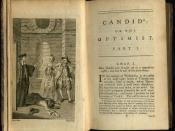In Candide, Voltaire uses sarcasm to explain his viewpoint of "reason plus action". His philosophy is that it is not enough simply to believe in certain values and morals, but it is more important that the actions a person takes reflect those beliefs accurately. In addition, Voltaire argues that life experience is necessary to the function of reason, meaning that the more experiences someone has had in their life, the more knowledge they will have, and the more accurate that knowledge will be. These principles can still be applied to life today, because what good are beliefs if they are never exercised?
In the beginning of the novel, we see Voltaire's beliefs expressed through Candide, a young, naïve man whose sole knowledge comes from that of Dr. Pangloss. Pangloss is a philosopher who believes that "everything is for the best in this best of all possible worlds" (319).
Without much experience living outside the Baron's castle in Westphalia, Candide has no other choice but to believe his philosopher and his stories. The reader can immediately see that Voltaire is mocking other philosophers of this era because Pangloss' ideals reek with sarcasm. However, no matter how ridiculous Pangloss' truths seem (i.e.: "noses were made to support spectacles, hence, we have spectacles" [319]) Candide believed them until he had enough life experience to have reason to think otherwise. This supports Voltaire's opinion that
Johnson 2
knowledge is not based on stories or philosophies, but rather on actions and experience.
Voltaire exhibits his belief that life experiences help to gain knowledge through the old woman and her story. In chapters 11 and 12, the old woman explains to Candide and Cunègonde the horrors that she has experienced in her life. Her story helps to shape Candide's view of life,


